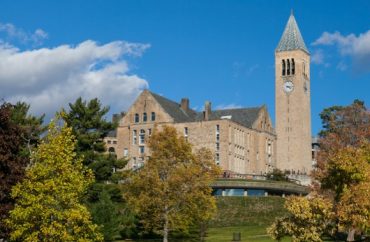
A noticeable lack of political diversity pervades college campuses such as Cornell. Perhaps liberal academia won the battle over students’ minds – an unabashedly far-left agenda saturates Cornell, as I am sure they intend. But if academia won, then students unwittingly lost. Cornell has failed the students it purports to nurture because its bias has choked out any room for debate, inquiry, or even freedom of thought or expression.
Cornell self-congratulates itself on a daily basis for its “inclusive” and “diverse” campus. These notions are patently false. Many (if not most) students who attend Cornell will never have a class with a Republican professor. Of course, this leads to extreme bias.
Over the course of four years, that bias – both inside and outside of the classroom – actually makes students far less perceptive and a great deal more robotic than when they arrived. Many liberal students and professors at Cornell will smirk and role their eyes at such a suggestion. But they shouldn’t, and here is why: The complete lack of any meaningful political diversity amongst the university’s faculty exposes Cornell’s mere lip service to any notion or desire for true “diversity.”
Cornell is not concerned with creating a diverse learning environment. In fact, I am not sure that anyone even knows what “diversity” means or what it looks like. The only thing I know for sure is that “diversity” certainly does not include “political diversity” to Cornell’s administration.
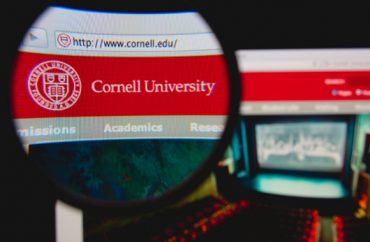 Nevertheless, Cornell is ravenous about the concept of diversity. One is inundated with Cornell’s clear zeal for ethnic, racial, national, and socio-economic diversity from the moment they arrive on campus. Cornell even pays some attention to religious diversity from time to time. But for all of the many, many pre-freshman programs and lectures on inclusivity and diversity there is one type of diversity that no one dare mention: diversity of thought. Diversity of thought is not to be promulgated.
Nevertheless, Cornell is ravenous about the concept of diversity. One is inundated with Cornell’s clear zeal for ethnic, racial, national, and socio-economic diversity from the moment they arrive on campus. Cornell even pays some attention to religious diversity from time to time. But for all of the many, many pre-freshman programs and lectures on inclusivity and diversity there is one type of diversity that no one dare mention: diversity of thought. Diversity of thought is not to be promulgated.
But how does this tangibly and negatively impact students’ learning and growth? For starters, liberal students are never given the opportunity to challenge their assumptions and beliefs. Non-partisan students never hear that there are often alternative and relevant perspectives.
Conservative students, on the other hand, are sharpened like iron. Their beliefs and ideas are tested and refined day after day. My peers and I never had a Government professor who identified as a Republican. We could not have even if we wanted to: there are none. Every day I was forced to critically consider whether what my professor articulated was consistent with my own ideology or not – my peers were never afforded that opportunity. They were rarely, if ever, really induced to ask themselves why they believe what they do and test the merits of their assumptions against the professor’s opinions and analysis. I believe this is a grave injustice.
Frankly, they don’t know what they’re missing.
Additionally, the complete lack of Republican professors stifles many conservative and libertarian students from voicing their opinions in class. Professors occasionally mock or ridicule students on the political Right. It is not uncommon for professors to make offensive and sweeping generalizations against those they disagree with. Some I have personally heard include “All Southern Christians are homophobes,” “The entire Republican Party is xenophobic,” and “When I see a bumper sticker that says, ‘Proud Parent of a Marine,’ I read ‘I am a failure as a parent.’”
 What was that again about “inclusivity”? Inclusivity and diversity exist for some people at Cornell, but certainly not Republicans. Professors likely feel they can say these things because they do not have peers that challenge them or their unconstrained bias. That is not to say we need safe spaces from opinions we disagree with. No, safe spaces are for people whose opinions are not challenged by the university’s leftist establishment anyway. Safe spaces are for those who would rather hide from adverse opinions than grow stronger because of them. At Cornell, safe spaces are, ironically, for the majority. But blanket attacks on the morality of Christians, Republicans, and our veterans are not arguments to be rebutted. They are the sad and inevitable result of an unchecked agenda. Question your professor at your own peril because words don’t stick, but your grade does.
What was that again about “inclusivity”? Inclusivity and diversity exist for some people at Cornell, but certainly not Republicans. Professors likely feel they can say these things because they do not have peers that challenge them or their unconstrained bias. That is not to say we need safe spaces from opinions we disagree with. No, safe spaces are for people whose opinions are not challenged by the university’s leftist establishment anyway. Safe spaces are for those who would rather hide from adverse opinions than grow stronger because of them. At Cornell, safe spaces are, ironically, for the majority. But blanket attacks on the morality of Christians, Republicans, and our veterans are not arguments to be rebutted. They are the sad and inevitable result of an unchecked agenda. Question your professor at your own peril because words don’t stick, but your grade does.
The explicit bias against Republicans reaches much farther than the confines of the classroom. What begins with a classroom environment that does not respect differing opinions quickly spreads outwards. Or, perhaps, it is the other way around.
 One of the first things that I noticed at Cornell was that students do not enjoy opinions that are different – or even nuanced – from their own. But “do not enjoy” does not quite capture it. It is much more sinister. When you disagree with a student (no matter how big or small the topic), they subtly squint their eyes and incredulously let slip a slight, exasperated inflection in their tone. Their eyes narrow and turn icy.
One of the first things that I noticed at Cornell was that students do not enjoy opinions that are different – or even nuanced – from their own. But “do not enjoy” does not quite capture it. It is much more sinister. When you disagree with a student (no matter how big or small the topic), they subtly squint their eyes and incredulously let slip a slight, exasperated inflection in their tone. Their eyes narrow and turn icy.
As a Republican, that’s when you know you have made a mistake. A big mistake. Unfortunately, this is not hyperbole. Republicans are a priori assumed to be, at best, ignorant and stupid, and, at worst, caricatures of ruthless 19th century robber barons to be chopped down to size. Even a slight disagreement with another student instantly confirms their assumptions about you. Words like racist, sexist and bigot are thrown around with voracious zeal and frequency. Truly, such terms have lost their meaning on college campuses. They are akin to stating “I disagree with you” or “I don’t like you.”
Naturally, this affects students’ education. Liberal students get what they want and conservative students suffer without recourse. Does this statement seem like a bit much? Is it really that bad? If you are involved in campus politics, then it is actually much worse. Students on the Left conduct sit-ins, walkouts, die-ins and protests for every conceivable issue. Outrage pays.
I have seen activist students yell at Jewish students that they support apartheid. I have witnessed students protestors shout down the president of the university and scream in his face because the Cornell Student Assembly voted to indefinitely table a motion that requested the university divest from all Israeli companies. At one point, the former president even had his office “occupied” by angry students. I also witnessed a Republican student receive death threats for daring to say she would vote for Trump over Clinton if she had to choose between the two.
Another Republican student wrote that he believed in awarding due process 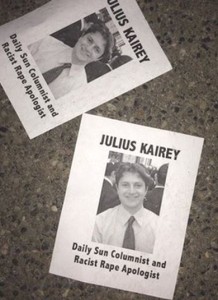 and reserving judgment against students accused of sexual assault until they are found guilty of the crime. Does this seem reasonable? Not to Cornell’s students. Leaflets were distributed around campus with his face and the words “Racist Rape Apologist” emblazoned on them. Cornell did nothing in response.
and reserving judgment against students accused of sexual assault until they are found guilty of the crime. Does this seem reasonable? Not to Cornell’s students. Leaflets were distributed around campus with his face and the words “Racist Rape Apologist” emblazoned on them. Cornell did nothing in response.
Ultimately, why have a debate when whoever screams the loudest gets what they want? Students are not used to being told something they do not like and non-politically salient groups (like Republicans) are the first to suffer. In short, inmates run the asylum.
My own experiences were no different. I was told by a member of the Student Assembly to never go anywhere around campus alone after dark because of my political opinions. A group of students and university trustees once asked me if I supported a proposed “diversity requirement” for incoming freshmen. I explained that I did not because we already have enough requirements and I did not think any classes that checked the university’s diversity box would include any tangible diversity of thought. A student’s retort was quick: “Well, we don’t need diversity of thought because we don’t need offensive opinions.” It should be telling that what a Republican offers to a discussion of diversity is assumed to be “offensive” before the opinion is even heard.
 During one particularly memorable Government class, the professor invited a guest speaker who at one point offered to help coach a student on how to convince her pre-teen niece to try cocaine despite her niece’s reservations. It should be noted that the same speaker advocated for abolishing all prisons. Yes, all prisons.
During one particularly memorable Government class, the professor invited a guest speaker who at one point offered to help coach a student on how to convince her pre-teen niece to try cocaine despite her niece’s reservations. It should be noted that the same speaker advocated for abolishing all prisons. Yes, all prisons.
My junior year, a graduate teaching assistant (TA) of mine made a revealing comment in my Government class’s discussion section. Someone in the class mentioned the political tone of the course. What my liberal TA said next shocked me. He furtively looked out the window over his shoulder and proceeded to tell us that the Government department strives for homogeneity in its faculty’s political beliefs. He went on to say that if they ever receive a resume from a Republican applicant it is promptly tossed in the garbage. Communists, he said, are okay, but Republicans are not. He then begged us not to tell the professor what he told us. I sincerely wish I was making this up, but unfortunately I am not.
Campuses are saturated with a suffocating ideology that every Republican recognizes and feels immediately and Democrats try to laugh off. The end result is that the complete lack of Republican professors does not merely induce a poor education – it is actually dangerous to Republican students. At Cornell, you stick to the party line or suffer the consequences.
The irony is palpable. American universities have sacrificed diversity on an altar of ideological homogeneity.
Brandon Thompson graduated from Cornell University in May 2016 with a
Bachelor’s Degree in History and Government.
Like The College Fix on Facebook / Follow us on Twitter
IMAGES: Shutterstock
Like The College Fix on Facebook / Follow us on Twitter
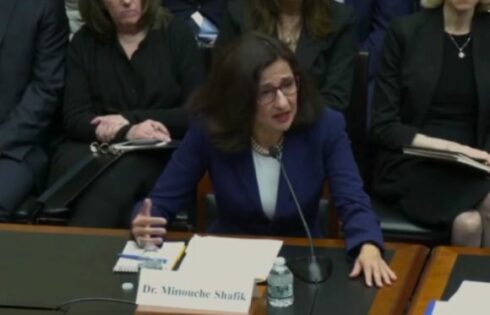
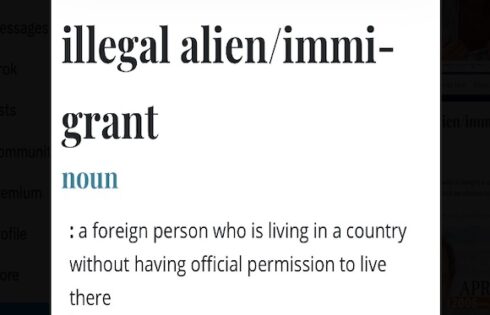

Please join the conversation about our stories on Facebook, Twitter, Instagram, Reddit, MeWe, Rumble, Gab, Minds and Gettr.